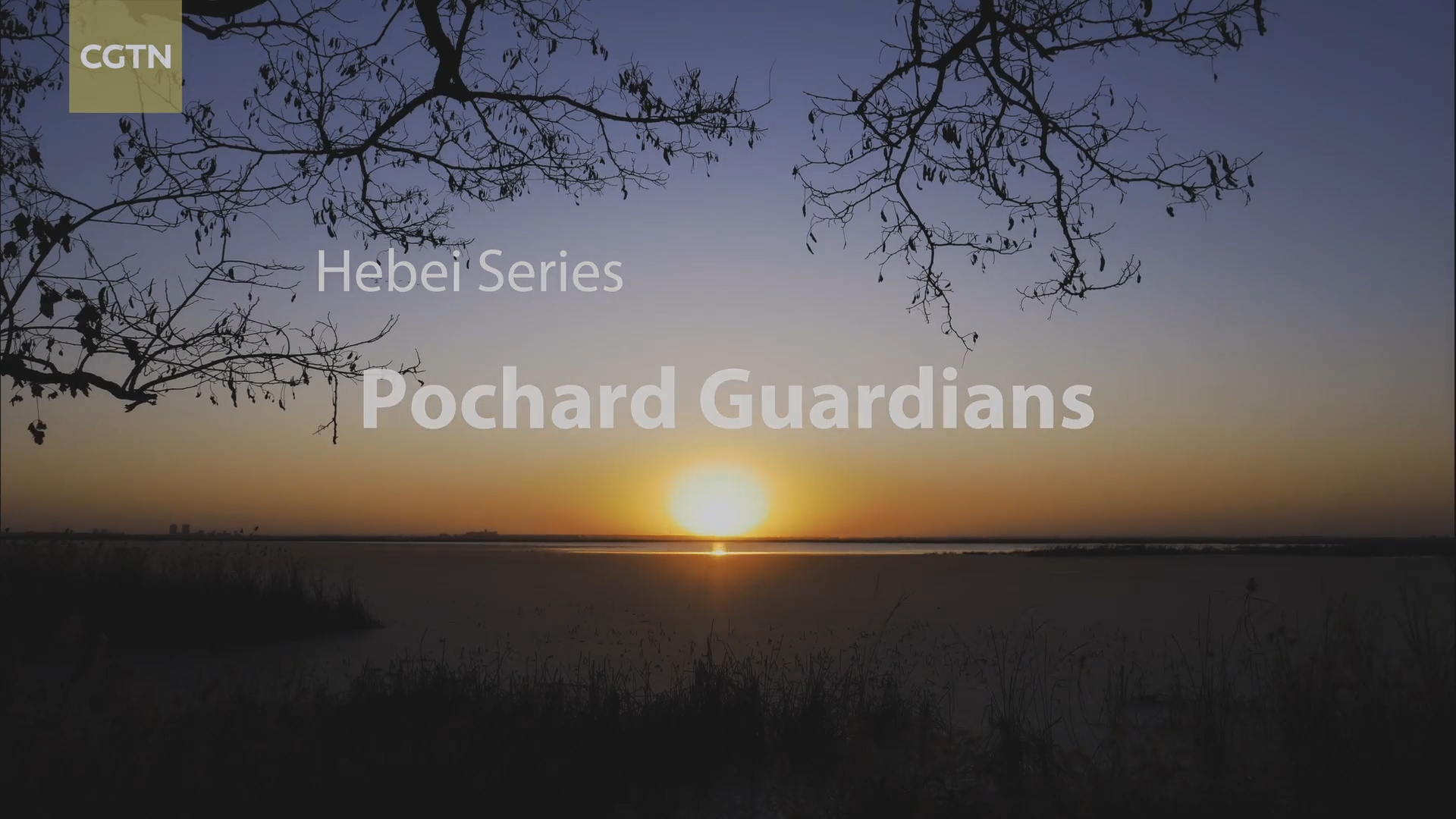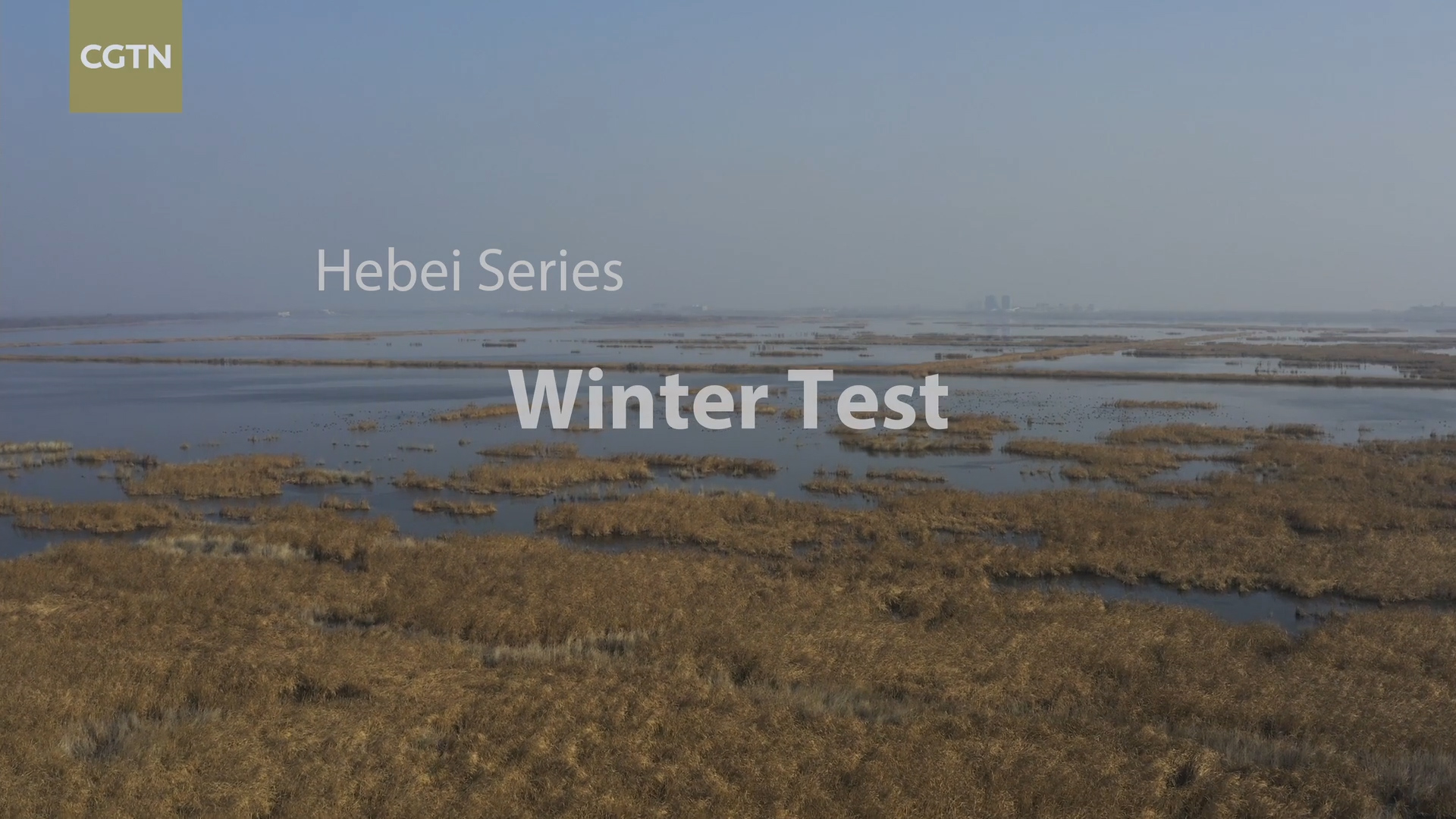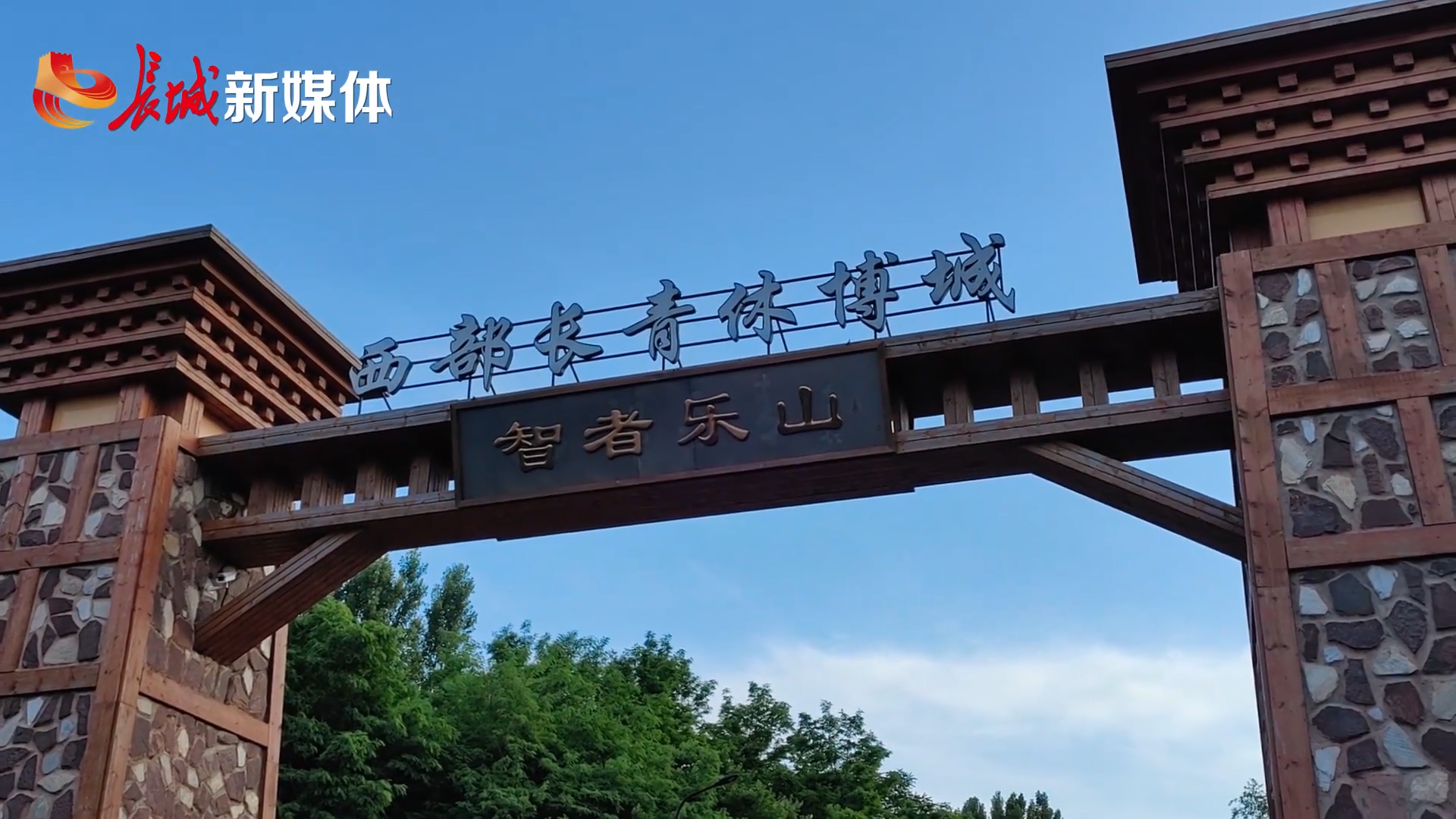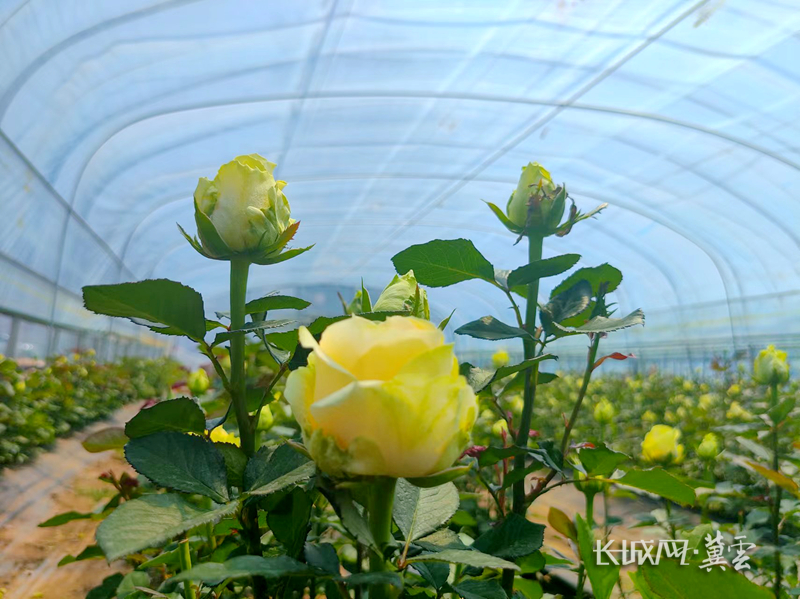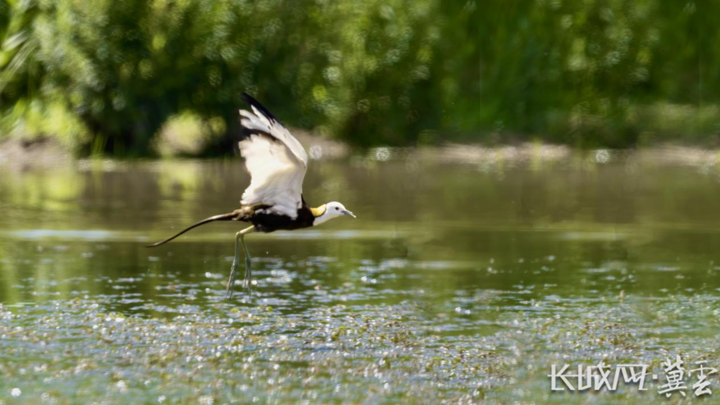“不用任何滤镜,随手一拍就是美不胜收的画面。”8月16日一大早,河北省丰宁满族自治县摄影家协会副主席卢云成再次来到小坝子,把这里天蓝、林密、草长、水清的盛夏美景定格在一张张照片中。
“A mere click of the shutter, without filters, the beautiful pictures would roll out of the camera.” Early on the morning of August 16, Lu Yuncheng, vice-chairman of the Fengning Manchu Autonomous County Photographers Association of Hebei Province came to Xiaobazi again and fixed the beautiful summer day scenes of blue skey, dense forests, luxuriant grass and clear water in his camera frame.
小坝子乡位于丰宁县城西北部,20多年前这里曾是距北京最近的沙源地之一,沙化面积高达70%多。卢云成从1990年开始到小坝子拍照,用5万多张照片记录了这片土地“由黄变绿”的生态奇迹。
Xiaobazi is located in the Northwestern part of Fengning County. It used to be one of the sandstorm sources nearest Beijing 20 years ago. The area of land desertification reached up to more than 70 percent. Lu Yuncheng started photoshooting Xiaobazi since the year 1990. He has taken more than 50,000 photos, recording the miracle of having this land turned “from yellow to green”.
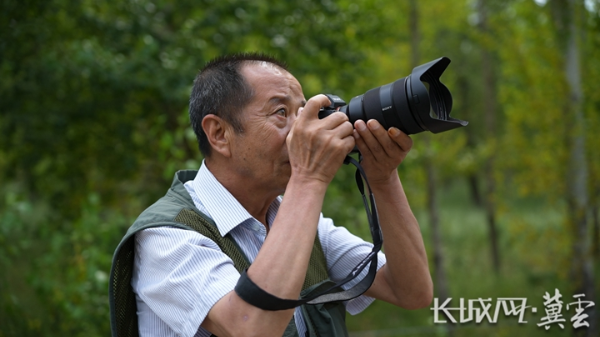
河北省丰宁满族自治县摄影家协会副主席卢云成用5万多张照片记录了小坝子“由黄变绿”的生态奇迹。长城网·冀云客户端记者 乔娅 摄
Vice Chairman of the Fengning Manchu Autonomous County Photographers Association Lu Yuncheng has taken more than 50,000 photos to record the miracle of Xiaobazi in turning the land "from yellow to green" (Photo by Qiaoya/Great Wall New Media)
“北京十粒沙,丰宁占七八。”小坝子乡槽碾沟村党支部书记郎占民介绍说,丰宁是潮河、滦河的故乡和京津水源地,上世纪五六十年代,小坝子也是一片绿洲,山上都是郁郁葱葱的树木。大约在上世纪八十年代,一些村民为了生计,将沙棘、刺柳等植被砍掉,把河滩改为耕地,还大量散养牛羊。短短几年时间,耕地慢慢变成了沙丘,绿色在这里消失了。
“Of the ten grains of sand in Beijing, seven or eight came from Fengning,” said Lang Zhanmin, Party branch secretary of the Caoniangou Village. Fengning is home to the Chaohe and Luanhe rivers and a drinking water source of Beijing and Tianjin. In the 1950-60s, the village was an oasis, with green trees on the mountains. But, up to 1980s, some villagers cut the sea buckthorns and Fructus Hippophaes and other vegetations, reclaimed land from the riverbeds. In addition, the local people engaged in free-range breeding of cattle and sheep. In a short span of a few years, the arable land gradually became sand dunes and what was green disappeared altogether.
“牛能上墙,猪能上房,道被堵死,庄稼埋光。”这是小坝子人对风沙最真实的记忆。“刮两三天风,村民就得从房前推出两车沙,否则房门就会被沙子堵住。”卢云成展示着当年拍摄的照片回忆说。
“Cattle could go up the walls and pigs could climb up the roofs of the houses, roads were blocked, and crops were all buried under sand.” This is the truest picture in the minds of Xiaobazi villagers about its past. “When the wind was blowing for two or three days, the villagers had to dig out two carts of sand from their front doors. Otherwise, they could not open the doors,” said Lu Yuncheng, pointing to the photos he took back then.
风沙不仅给当地群众生产生活带来灾害,还给200公里外的北京造成环境压力:加重了北京的沙尘暴天气,威胁着潮白河的水源,直接影响到北京的生活用水。小坝子一度成了“沙化严重”的代名词。
The sandstorms did not only bring disasters to the local people in their production and livelihood but also exert environmental pressure to bear upon Beijing, aggravating the sandstorms in the capital and threatening the drinking water source -- the Chaobai River, posing direct threat to Beijing's drinking water supply. Xiaobazi once became the synonym for “severe desertification”.

20多年前的小坝子,还是风沙肆虐的不毛之地,漫漫黄沙曾经覆盖了许多人的家园。河北省林业和草原局供图
20 years ago, Xiaobazi was a barren land subjecting to sandstorms, with yellow sand covering many people's homes. (Photo courtesy of the Forestry and Grassland Bureau of Hebei Province)
槽碾沟则是小坝子乡风沙最严重的村。“那时才知道,生态不行啥也干不成。”1998年,当兵返乡不久的郎占民和一些村民只得无奈出门打工,昔日热闹的村庄变得越来越沉寂,许多农家只有老人在留守。
Caoniangou village used to be the worst affected by sandstorms. “Only then, people began to realize that without a good ecology, nothing could be accomplished.” In 1998, Lang Zhanmin and some villagers who returned home from military service had to seek jobs as hired hand elsewhere. The village, which used to be very lively, became dead and in many families, only old people were left.
“能在家门口把日子过好,谁愿意背井离乡呢?”小坝子乡乡长孙冬梅说,丰宁沙化问题引起各级党委、政府的高度重视,发出“防沙止漠,刻不容缓”的号召。从此,一场旷日持久的人沙大战再没有止歇。
“Who wanted to leave their homes if they had lived well at home?” said Sun Dongmei, town mayor of Xiaobazi. The desertification problem aroused high attention from Party committees and governments at all levels. They issued the call of “seizing the time to stop desertification”. Since then, a protracted battle against sandstorms has never ceased.
每年植树季,在小坝子都能看到数千名干部群众在沙窝里挥锹抡镐、扶苗培土。退耕还林、京津风沙源治理等一大批生态建设项目相继实施。近年来,小坝子乡平均每年造林20多万亩,森林覆盖率由之前的15%增至30%,林草植被覆盖率由30%提高到70%,土地沙化面积减少六成多。孙冬梅自豪地说:“现在好了,风照样刮,但沙子没了。”
In every tree planting season, thousands of people pitched in. A large number of ecological restoration projects started one after another, such as the return of farmland reclaimed from forests, the Beijing-Tianjin control of the sources of sandstorms. Xiaobazi has in recent years afforested more than 200,000 mu a year on average. The forest cover has increased from 15 percent in the past to 30 percent now. The forest-grass vegetation coverage has increased from 30 percent in the past to 70 percent at present. The desertified area has been reduced by more than 60 percent. “Now, things have changed. The wind is blowing as usual, but sand has disappeared,” said Sun Dongmei proudly.

如今,小坝子乡林草植被覆盖率提高到70%以上。长城网·冀云客户端记者 乔娅 摄
Now, the forest-grass vegetation cover has increased to more than 70 percent. (Photo by Qiaoya/ Great Wall New Media)
如今,漫步在曾经“沙深五尺”的小坝子,不见沙子只见树。在山坡上、村道旁,一株株落叶松青翠欲滴,一棵棵白杨树枝叶繁茂,一丛丛草灌木绿意盎然。郎占民告诉记者,儿时那片“绿色的海”又回来了。
Nowadays, strolling around Xiaobazi, which used to be buried “five chi deep in sand”, one can see trees only but not sand. On the hillsides and by the roadside, the larches are shining with overflowing verdant green. Poplar trees are growing luxuriantly and flourishingly. The growths of bushes are shining with overflowing green. “The green sea in my childhood has returned again, ” said Lang Zhanmin.
“你看我们村乡亲的微信朋友圈,晒的全都是绿色风景照。”2018年,和很多外出打工的年轻人一样,郎占民主动回到小坝子,“现在就是刮10级大风也没沙子,再也不会找不到回家的路。”
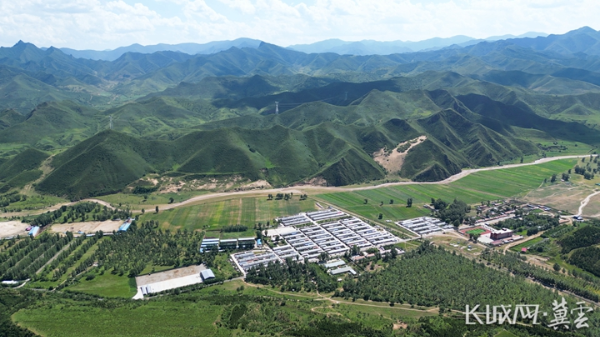
航拍镜头下的小坝子乡绿意盎然。长城网·冀云客户端记者 李丽钧 摄
An arial photo of Xiaobazi. (Photo by Li Lijun/Great Wall New Media)
为了把风沙肆虐的家乡变回绿洲,小坝子群众退耕还林还草,主动放弃畜牧散养。靠什么召唤更多人回乡并留下来,摆脱“树绿了,人还穷”的困境,小坝子开启了从“绿起来”到“富起来”的新接力。
In order to rein in the rampant sandstorm and turn the homeland green, People in Xiaobazi started returning farmland reclaimed from forests and grassland and voluntarily gave up free-range livestock breeding. What Xiaobazi relied on to call back people to return and stay on and end the dilemma of “trees becoming green, but people are still living in poverty? Xiaobazi has started a new round of relay from ‘getting green’ to ‘getting wealthy’”.
在槽碾沟村一排排蔬菜大棚里,村民们正采摘准备发往北京的西红柿。郎占民说:“我们积极鼓励引导农民发展大棚蔬菜种植,实现大棚蔬菜种植产业化、规模化,成为农民增收致富的新途径。”
In the rows of greenhouses in Caoniangou village, villagers are picking tomatoes destined to Beijing. “We have encouraged farmers to develop greenhouse vegetable growing in an industrialization and scale manner to make it a new way of enabling the farmers to increase income and embark on the path to wealth,” said Lang Zhanmin.
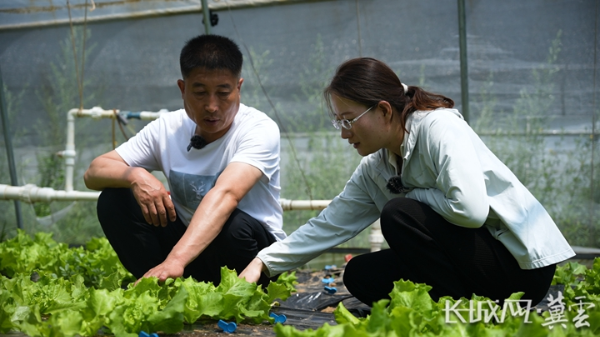
小坝子乡乡长孙冬梅(右)和小坝子乡槽碾沟村党支部书记郎占民在蔬菜大棚里查看蔬菜长势。长城网·冀云客户端记者 李丽钧 摄
Sun Dongmei (Right) and Lang Zhanmin (Left) inspecting vegetables growth in greenhouse. (Photo by Li Lijun/ Great Wall New Media)
山脚下一排排绿顶羊舍里,2000多只肉羊吃着几十种材调配而成的“营养餐”,“咩咩”欢叫。孙冬梅告诉记者,养殖业依然是小坝子乡重要的富民产业,通过“股份羊”“股份牛”等入股合作社集中圈养模式,实现了农民养羊不见羊,走出了一条生态、生计兼顾的新路子
In the row upon row of green-topped sheep pens down the hillsides, more than 2,000 mutton sheep are feeding themselves noisily with the nutritious meal made up of a score of ingredients. Sun Dongmei told reporters that breeding has remained an important getting-rich-quick industry in Xiaobazi. By concentrated pen-breeding operated by a cooperative with the share pooling mode, we have realized the ideal of breeding sheep but not seeing sheep and blazed a new path that gives consideration to both ecology and livelihood.
“之前小坝子给北京送去的是风沙,现在小坝子给北京送去了新鲜空气和有机蔬菜。”孙冬梅信心十足地说,只有“留得青山在”,才能“不怕没柴烧”,现在小坝子半数以上家庭拥有了小轿车,越来越多父老乡亲回到小坝子,过上了殷实幸福的好日子。
“Xiaobazi used to send sandstorms to Beijing but now it is sending fresh air and organic vegetables there,” said Sun Dongmei with full confidence, adding that “so long as the green mountains are there, there is no worry about firewood.” Now, more than half of the families in Xiaobazi have their own cars, and more and more folks working elsewhere have come back, living a prosperous and happy life.
Editor: Zheng Bai


